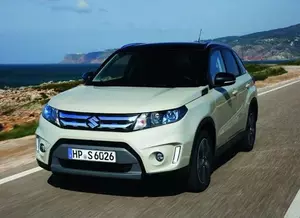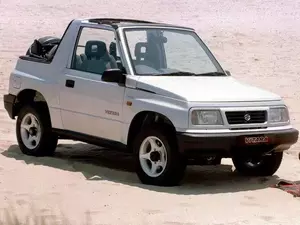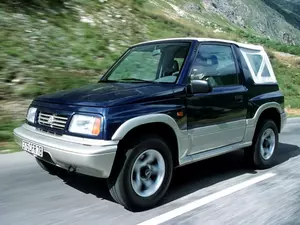
| Vehicle | Curb weight | Difference from world's smallest | Weight to power ratio | 0—60 mph acceleration ratio | Consumption ratio |
|---|---|---|---|---|---|
| 1.4 BOOSTERJET |
1195 kg / 2635 lbs |
770 kg (1698 lbs) heavier | 9 kg to 1 hp | 123 kg/s (271 lbs/s) |
196 kg/L (432 lbs/L) |
| 1.0 BOOSTERJET |
1155 kg / 2547 lbs |
730 kg (1610 lbs) heavier | 10 kg to 1 hp | 101 kg/s (223 lbs/s) |
203 kg/L (448 lbs/L) |
| Vehicle | 1.4 BOOSTERJET |
|---|---|
| Curb weight |
1195 kg / 2635 lbs |
| Difference from world's smallest | 770 kg (770 lbs) heavier |
| Weight to power ratio | 9 kg to 1 hp |
| 0—60 mph acceleration ratio | 123 kg/s (271 lbs/s) |
| Consumption ratio |
196 kg/L (432 lbs/L) |
| Vehicle | 1.0 BOOSTERJET |
| Curb weight |
1155 kg / 2547 lbs |
| Difference from world's smallest | 730 kg (730 lbs) heavier |
| Weight to power ratio | 10 kg to 1 hp |
| 0—60 mph acceleration ratio | 101 kg/s (223 lbs/s) |
| Consumption ratio |
203 kg/L (448 lbs/L) |

| Vehicle | Curb weight | Difference from world's smallest | Weight to power ratio | 0—60 mph acceleration ratio | Consumption ratio |
|---|---|---|---|---|---|
| 1.6 VVT |
1185 kg / 2613 lbs |
760 kg (1676 lbs) heavier | 10 kg to 1 hp | 96 kg/s (212 lbs/s) |
208 kg/L (459 lbs/L) |
| 1.6 DDiS |
1230 kg / 2712 lbs |
805 kg (1775 lbs) heavier | 10 kg to 1 hp | 113 kg/s (249 lbs/s) |
308 kg/L (679 lbs/L) |
| 1.6 DDIS |
1295 kg / 2855 lbs |
870 kg (1918 lbs) heavier | 11 kg to 1 hp | 110 kg/s (243 lbs/s) |
308 kg/L (679 lbs/L) |
| 1.4 BOOSTERJET |
1235 kg / 2723 lbs |
810 kg (1786 lbs) heavier | 9 kg to 1 hp | 127 kg/s (280 lbs/s) |
225 kg/L (496 lbs/L) |
| Vehicle | 1.6 VVT |
|---|---|
| Curb weight |
1185 kg / 2613 lbs |
| Difference from world's smallest | 760 kg (760 lbs) heavier |
| Weight to power ratio | 10 kg to 1 hp |
| 0—60 mph acceleration ratio | 96 kg/s (212 lbs/s) |
| Consumption ratio |
208 kg/L (459 lbs/L) |
| Vehicle | 1.6 DDiS |
| Curb weight |
1230 kg / 2712 lbs |
| Difference from world's smallest | 805 kg (805 lbs) heavier |
| Weight to power ratio | 10 kg to 1 hp |
| 0—60 mph acceleration ratio | 113 kg/s (249 lbs/s) |
| Consumption ratio |
308 kg/L (679 lbs/L) |
| Vehicle | 1.6 DDIS |
| Curb weight |
1295 kg / 2855 lbs |
| Difference from world's smallest | 870 kg (870 lbs) heavier |
| Weight to power ratio | 11 kg to 1 hp |
| 0—60 mph acceleration ratio | 110 kg/s (243 lbs/s) |
| Consumption ratio |
308 kg/L (679 lbs/L) |
| Vehicle | 1.4 BOOSTERJET |
| Curb weight |
1235 kg / 2723 lbs |
| Difference from world's smallest | 810 kg (810 lbs) heavier |
| Weight to power ratio | 9 kg to 1 hp |
| 0—60 mph acceleration ratio | 127 kg/s (280 lbs/s) |
| Consumption ratio |
225 kg/L (496 lbs/L) |

| Vehicle | Curb weight | Difference from world's smallest | Weight to power ratio | 0—60 mph acceleration ratio | Consumption ratio |
|---|---|---|---|---|---|
| 1.6 |
1010 kg / 2227 lbs |
585 kg (1290 lbs) heavier | 13 kg to 1 hp | 71 kg/s (157 lbs/s) |
105 kg/L (232 lbs/L) |
| 1.6 16V |
1040 kg / 2293 lbs |
615 kg (1356 lbs) heavier | 11 kg to 1 hp | - |
109 kg/L (240 lbs/L) |
| 1.9 D |
1220 kg / 2690 lbs |
795 kg (1753 lbs) heavier | 16 kg to 1 hp | 75 kg/s (165 lbs/s) | - |
| 2.0 16V |
1115 kg / 2459 lbs |
690 kg (1522 lbs) heavier | 8 kg to 1 hp | 90 kg/s (198 lbs/s) | - |
| Vehicle | 1.6 |
|---|---|
| Curb weight |
1010 kg / 2227 lbs |
| Difference from world's smallest | 585 kg (585 lbs) heavier |
| Weight to power ratio | 13 kg to 1 hp |
| 0—60 mph acceleration ratio | 71 kg/s (157 lbs/s) |
| Consumption ratio |
105 kg/L (232 lbs/L) |
| Vehicle | 1.6 16V |
| Curb weight |
1040 kg / 2293 lbs |
| Difference from world's smallest | 615 kg (615 lbs) heavier |
| Weight to power ratio | 11 kg to 1 hp |
| 0—60 mph acceleration ratio | - |
| Consumption ratio |
109 kg/L (240 lbs/L) |
| Vehicle | 1.9 D |
| Curb weight |
1220 kg / 2690 lbs |
| Difference from world's smallest | 795 kg (795 lbs) heavier |
| Weight to power ratio | 16 kg to 1 hp |
| 0—60 mph acceleration ratio | 75 kg/s (165 lbs/s) |
| Consumption ratio | - |
| Vehicle | 2.0 16V |
| Curb weight |
1115 kg / 2459 lbs |
| Difference from world's smallest | 690 kg (690 lbs) heavier |
| Weight to power ratio | 8 kg to 1 hp |
| 0—60 mph acceleration ratio | 90 kg/s (198 lbs/s) |
| Consumption ratio | - |

| Vehicle | Curb weight | Difference from world's smallest | Weight to power ratio | 0—60 mph acceleration ratio | Consumption ratio |
|---|---|---|---|---|---|
| 2.0 TDI |
1405 kg / 3098 lbs |
980 kg (2161 lbs) heavier | 17 kg to 1 hp | - |
151 kg/L (333 lbs/L) |
| 2.0 i V6 24V |
1310 kg / 2889 lbs |
885 kg (1952 lbs) heavier | 10 kg to 1 hp | 110 kg/s (243 lbs/s) |
136 kg/L (300 lbs/L) |
| 1.6 i 16V |
1040 kg / 2293 lbs |
615 kg (1356 lbs) heavier | 11 kg to 1 hp | 84 kg/s (185 lbs/s) |
109 kg/L (240 lbs/L) |
| 1.6 i |
1020 kg / 2249 lbs |
595 kg (1312 lbs) heavier | 13 kg to 1 hp | 71 kg/s (157 lbs/s) |
120 kg/L (265 lbs/L) |
| 1.9 D |
1300 kg / 2867 lbs |
875 kg (1930 lbs) heavier | 19 kg to 1 hp | - | - |
| 1.9 TDI |
1445 kg / 3186 lbs |
1020 kg (2249 lbs) heavier | 16 kg to 1 hp | - | - |
| 2.0 TD |
1405 kg / 3098 lbs |
980 kg (2161 lbs) heavier | 20 kg to 1 hp | - |
151 kg/L (333 lbs/L) |
| Vehicle | 2.0 TDI |
|---|---|
| Curb weight |
1405 kg / 3098 lbs |
| Difference from world's smallest | 980 kg (980 lbs) heavier |
| Weight to power ratio | 17 kg to 1 hp |
| 0—60 mph acceleration ratio | - |
| Consumption ratio |
151 kg/L (333 lbs/L) |
| Vehicle | 2.0 i V6 24V |
| Curb weight |
1310 kg / 2889 lbs |
| Difference from world's smallest | 885 kg (885 lbs) heavier |
| Weight to power ratio | 10 kg to 1 hp |
| 0—60 mph acceleration ratio | 110 kg/s (243 lbs/s) |
| Consumption ratio |
136 kg/L (300 lbs/L) |
| Vehicle | 1.6 i 16V |
| Curb weight |
1040 kg / 2293 lbs |
| Difference from world's smallest | 615 kg (615 lbs) heavier |
| Weight to power ratio | 11 kg to 1 hp |
| 0—60 mph acceleration ratio | 84 kg/s (185 lbs/s) |
| Consumption ratio |
109 kg/L (240 lbs/L) |
| Vehicle | 1.6 i |
| Curb weight |
1020 kg / 2249 lbs |
| Difference from world's smallest | 595 kg (595 lbs) heavier |
| Weight to power ratio | 13 kg to 1 hp |
| 0—60 mph acceleration ratio | 71 kg/s (157 lbs/s) |
| Consumption ratio |
120 kg/L (265 lbs/L) |
| Vehicle | 1.9 D |
| Curb weight |
1300 kg / 2867 lbs |
| Difference from world's smallest | 875 kg (875 lbs) heavier |
| Weight to power ratio | 19 kg to 1 hp |
| 0—60 mph acceleration ratio | - |
| Consumption ratio | - |
| Vehicle | 1.9 TDI |
| Curb weight |
1445 kg / 3186 lbs |
| Difference from world's smallest | 1020 kg (1020 lbs) heavier |
| Weight to power ratio | 16 kg to 1 hp |
| 0—60 mph acceleration ratio | - |
| Consumption ratio | - |
| Vehicle | 2.0 TD |
| Curb weight |
1405 kg / 3098 lbs |
| Difference from world's smallest | 980 kg (980 lbs) heavier |
| Weight to power ratio | 20 kg to 1 hp |
| 0—60 mph acceleration ratio | - |
| Consumption ratio |
151 kg/L (333 lbs/L) |